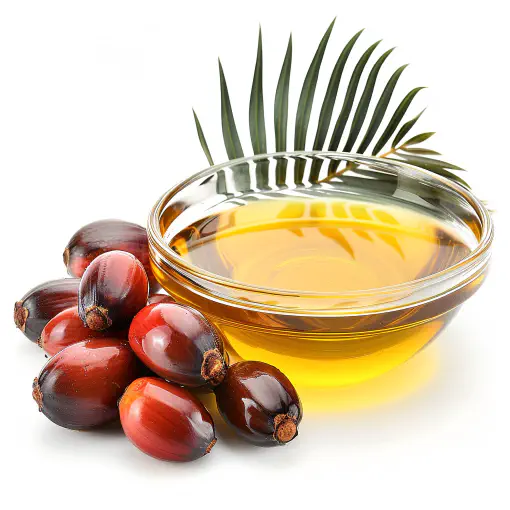Palm oil is a vegetable oil derived from the fruit of oil palm trees.
Characteristics
-
Appearance:
Palm oil is typically a yellow-orange to reddish liquid at room temperature. It has a smooth and creamy consistency.
-
Melting point:
The melting point of palm oil is around 35-45 degrees Celsius (95-113 degrees Fahrenheit). This relatively low melting point allows it to remain liquid at room temperature.
-
Density:
The density of palm oil is approximately 0.89 grams per milliliter. It is slightly less dense than water.
-
Viscosity:
Palm oil has a relatively high viscosity, meaning it flows sluggishly. However, its viscosity decreases as the temperature increases, becoming more fluid.
-
Solidification:
When cooled below its melting point, palm oil solidifies into a semi-solid or solid form, depending on the specific application. This property is helpful when it comes to certain food processing, such as making margarine or shortening.
-
Odor and taste:
Palm oil has a distinct odor and taste. It has a mild, nutty aroma and a neutral flavor, making it versatile for use in various dishes and food products.
-
Shelf life:
Palm oil has good oxidative stability, which means it has a relatively long shelf life compared to some other vegetable oils. This property contributes to its suitability for use in food products and industrial applications.
Note: It’s important to note that palm oil can come in different grades, such as crude palm oil and refined palm oil, with slight variations in certain physical properties. These properties can also be influenced by factors such as processing methods and storage conditions.
Applications
Palm oil has numerous industrial applications due to its unique properties and versatility. Some common industrial applications of palm oil:
-
Food industry:
Palm oil is widely used in the food industry as an ingredient in a variety of products. It is used in cooking oils, margarine, shortening, and various processed foods like snacks, baked goods, and ready-to-eat meals. Palm oil’s stability at high temperatures and neutral flavor make it suitable for frying and cooking applications.
-
Personal care and cosmetics:
Palm oil is used in the production of soaps, lotions, creams, and other personal care products. It adds moisturizing properties, contributes to a smooth texture, and helps products hold their scent.
-
Biofuel:
Palm oil is a significant feedstock for the production of biodiesel, which is a renewable and cleaner-burning alternative to fossil fuel-based diesel. Its high energy content and low sulfur content make it an attractive option for biodiesel production.
-
Oleochemical industry:
Palm oil serves as a valuable raw material for the oleochemical industry, which produces various chemicals from natural oils and fats. These chemicals are used in the manufacturing of detergents, surfactants, lubricants, paints, coatings, and many other industrial products.
-
Animal feed:
Palm oil by-products, such as palm kernel expeller, are utilized in animal feed formulations for livestock, poultry, and aquaculture. These by-products provide a source of energy and nourishment for animals.
-
Pharmaceutical industry:
Palm oil derivatives, such as palm oil esters, find applications in the pharmaceutical industry. They can be used as excipients in drug formulations to enhance solubility, stability, and absorption of certain medications.
-
Industrial lubricants:
Palm oil-based lubricants are used in various industrial applications, primarily as environmentally friendly alternatives to petroleum-based lubricants. They offer excellent lubricity and biodegradability, making them suitable for industries such as automotive, machinery, and manufacturing.
-
Surfactants and emulsifiers:
Palm oil-based surfactants and emulsifiers are used in a wide range of applications, including cleaning products, detergents, emulsions, and formulations requiring oil-water mixtures.
These are just a few examples of how palm oil is utilized across various industrial sectors. Its versatility, affordability, and availability make it a valuable resource for different applications.
